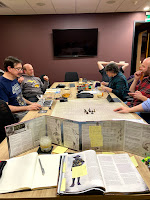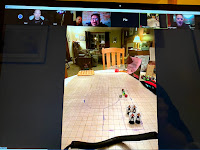 |
| Games. ALL OF THEM. |
demanded that I have it. But maybe I don't ever play it. Nuts, right? If it's so goddamn great, what's the problem? The problem: maybe if I do, maybe everything indeed changes. Am I ready for that?
I'll tell you the game in a bit, maybe later. If I do it now, I'm gonna write gushingly about it. The name of the game isn't the point. It's the mechanic. And a big piece of the mechanic of this board game is: storytelling.
Storytelling? In a board game??
Guys. This is where I'm headed. Since when is a board game about storytelling? Board games are about buying Park Place, or saying "Sorry!," or winning because you nabbed Australia first, right?
They used to be. They still can be. But board games are figuring out what my First Love has known all along: storytelling is central to our species. Telling stories is literally what separates us from the animals. We looked at stars and asked why and made a story about them. We looked at us and asked why and made a story about us.
Storytelling can be passive: we sit as a friend tells us a funny story; a pastor at church relates a biblical story to a modern-life story; we listen to a podcast; we watch a play or movie; a parent reads a child a book. But what if storytelling was active? Participatory? What if we told stories together? How sublime that we, a communal species, create a fiction together...tell a story together...explode our imaginations together?
Two paragraphs ago, I mentioned my First Love (with regard to gaming, folks, come on now). Ready? I've loved my First Love for 33 years. We met when I was 14. We've been together, weekly, monthly, yearly, ever since. Here's the Big Reveal:
 |
| Working professionals by day; Elves, Gnomes, Halflings, and sure, Humans by night |
 |
| In 2020, Storytelling looked a little... different? |
Authors, when they're interviewed, talk about how they write their characters, write a situation, and "see what happens." Sure, maybe, probably. They have an idea, or a few, and they game them out, but it's not likely random like human behavior and decisions truly are. But when I work with - tell a story with - my players? My friends? It's just...sublime. It's us. It's biases and group dynamics and mob behavior and deviousness and compassion. A push and pull around motivations and desires, where I try to move a story and where they drag it anyway. It's perfect. And what makes this so true is that right now, I DM two similar groups of different people with two different levels of experience with the game: each group is a collection of well-educated, multiple-degreed, Type-A types who revel in curve-balls and whose jobs require flexible, seat-of-the-pants thinking; but one group started playing last April after hearing about the game and wanting something to do in a pandemic...and the other group, like me, have been playing for decades.
 |
| Some of the tools of the trade, with a Pandemic twist |
These are not "versus" relationships. They're partnerships. And each of these groups plays the very same adventure, or module (in gamer-speak), or tells the same story (in all-of-us speak), in very different ways! Different responses, reactions, directions. It's collective storytelling in its purest form.
Role Playing Games have evolved a little to include miniatures - or more rightly, they're always included the possibility of using minis, but they've evolved now to emphasize it - because fighting and combat is a part of the story. The game started as an "all in the mind's eye" game, and has moved to storytelling-plus-pieces-on-a-table. In other words, role playing games are increasingly a hybrid between the tabletop miniature warfare games that inspired them, modern board games, and storytelling!
 |
| All the cool kids do it too |
But it's this evolution that brings this full-circle. The newest and best board games tell a story. The board of the board game itself changes depending on how you play the game, and what the outcome is of the game you played before the game...on the same board...you're playing now. For those not so deep in nerd-dom as my boys and friends and I, picture it this way: imagine you buy Boardwalk and Park Place. And then you Monopolize them - you put the Hotels on those properties. and everyone, when their pieces are on that side of the board, are like "oh god please don't roll a 5,"
But now, with the next evolution of board games, imagine that another Monopoly player breaks a story about worker abuses among your hotel staff at Park Place. And imagine that the other 3 of your opponents pooled their resources and launched a PR campaign that publicizes not only your worker abuse scandal at Park Place, but also your horrible money-laundering scheme at Atlantic and Ventnor Ave and Marvin Gardens and how you bribed the Mayor for economic development dollars to put houses on those properties at a net bank cut. And as a result: you have to put permanent stickers on the Monopoly Board on those properties that devalue their worth to lower-than-Mediterranean-and-Baltic, and a new game rule is instituted that requires you to pay all the other players $50 every time you pass go as part of a settlement agreement.
 |
| The origin story of all origin stories, told via the artwork of the story |